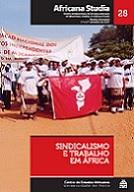Strengths and Weaknesses of African Trade Unions in the Neoliberal Period with a Sierra Leone Case Study
Resumo
This article provides an overview of the weaknesses and strengths of trade unions in Africa, as neoliberal economic policies continue to spread across the continent. Five problems affecting the ability of trade unions to formulate effective policies and practices are outlined and discussed: poor organisational ability, low financial capacity, an over-emphasis on representing formal sector workers, inadequate enforcement of legislation protecting labour rights and the absence of effective central bargaining
units. Two strengths of African labour organisations are highlighted: first, their representation, in many cases, of significant numbers of the working class. Second, the will and capacity demonstrated by some trade unions
to undertake concerted actions against policies that have adversely affected the labour force. In addition, two points of leverage trade unions have in negotiating with the state and representatives of capital are assessed. First,
the wide gap that has developed in Africa between the incomes of a rich minority and the large numbers of the workforce who continue to live in poverty. Second, the rising amount of profits that are being repatriated by foreign investors, exploiting lucrative economic sectors. This exposes the emptiness of continued arguments by governments that labour movements must subordinate their claims on behalf of members to those of the greater ‘national interest’. To illustrate these issues empirically, a case study of trade unions in Sierra Leone is examined. The work, in particular, of the Sierra Leone Labour Congress (SLLC) and the Sierra Leone Teachers Union (SLTU) is discussed. The case study analysis highlights the substantive difficulties facing the SLLC and the SLTU in defending effectively the rights and interests of workers.
KeyWords: Trade unions, Labour, Sierra Leone.
Downloads
Downloads
Publicado
Como Citar
Edição
Secção
Licença
Os autores cedem à Revista Africana Studia o direito exclusivo de publicação dos seus textos, sob qualquer meio, incluindo a sua reprodução e venda em suporte papel ou digital, bem como a sua disponibilização em regime de livre acesso em bases de dados.
As imagens, no caso de serem originais e enviadas por via postal, serão devolvidas se assim for explicitado pelos autores.
A Africana Studia é uma revista de acesso aberto que visa promover a divulgação e o debate da investigação científica. Todos os artigos aceitos são, portanto, publicados gratuitamente para autores e editores.




